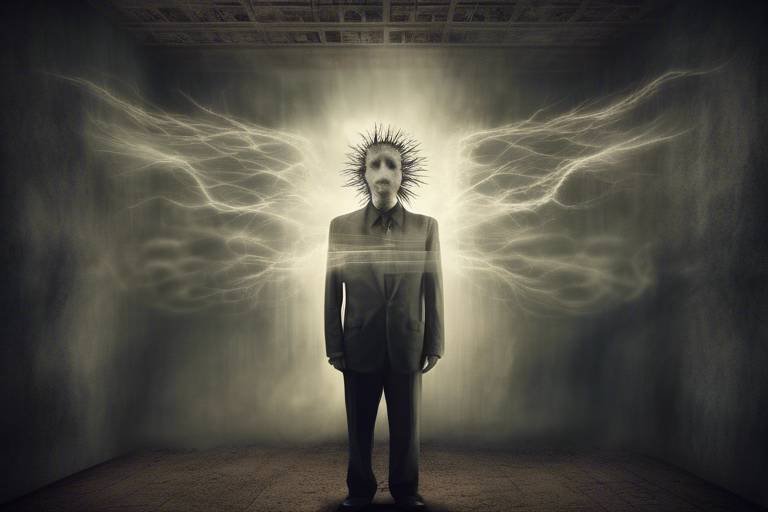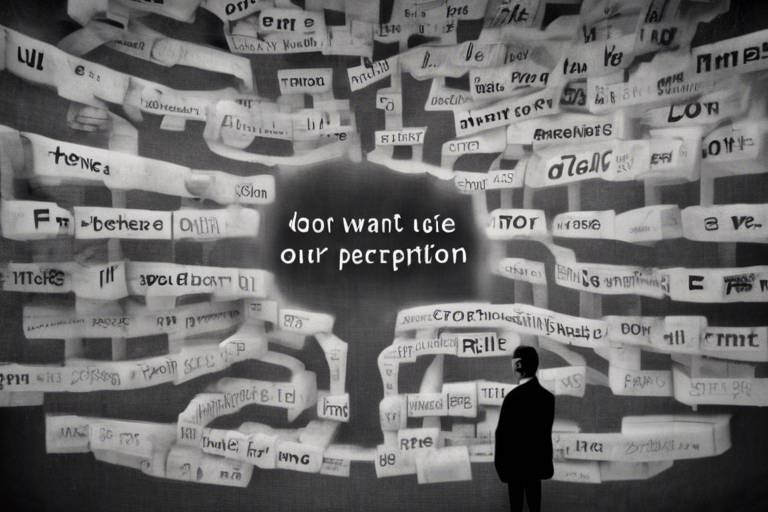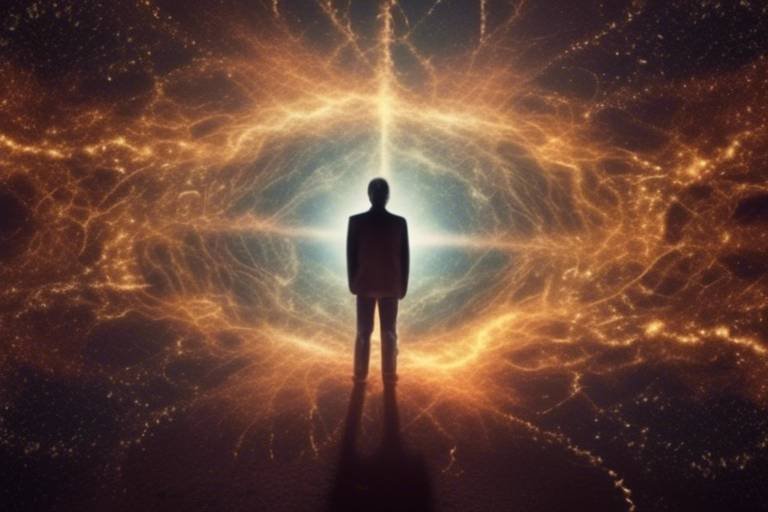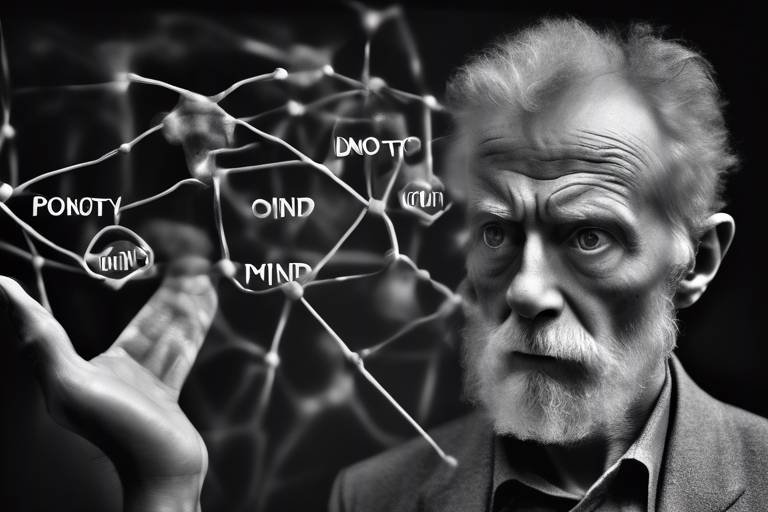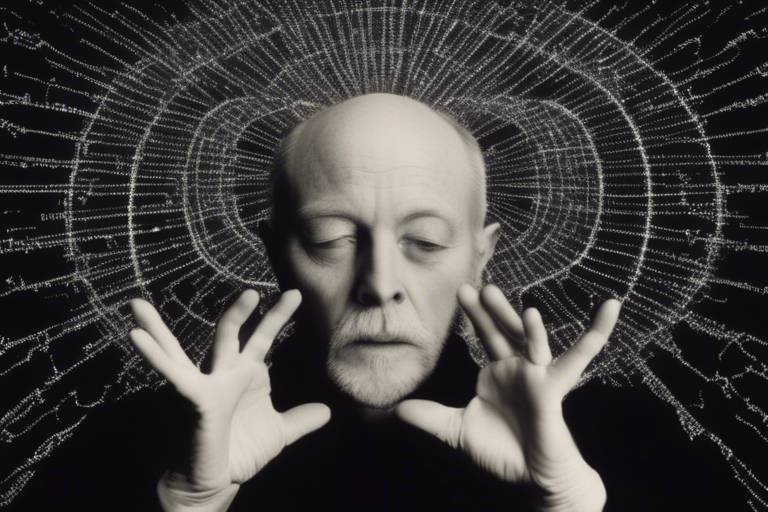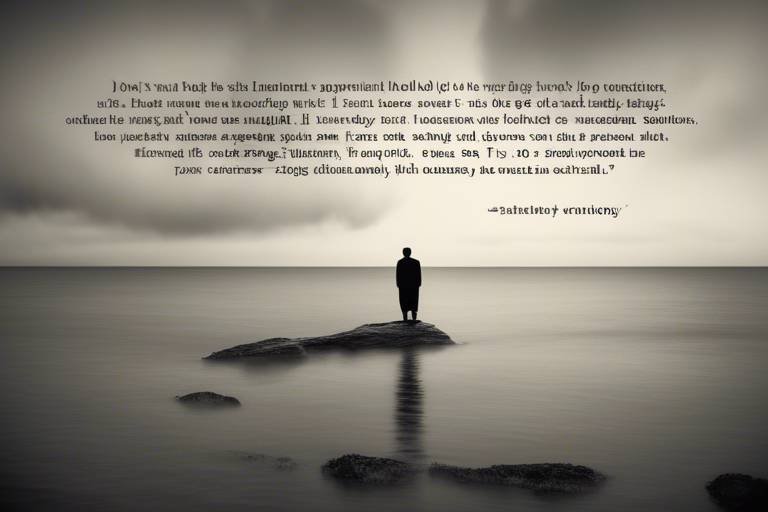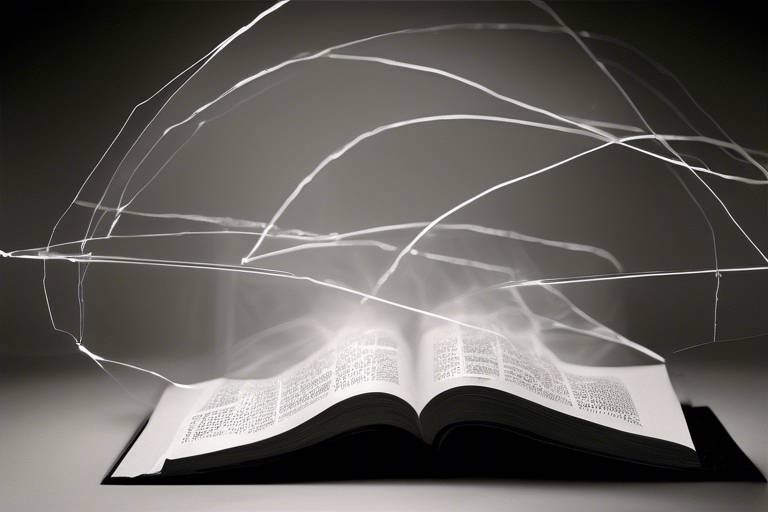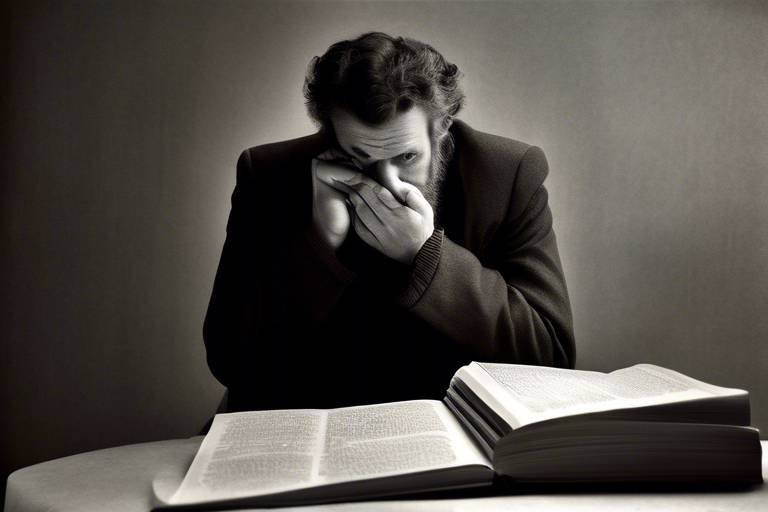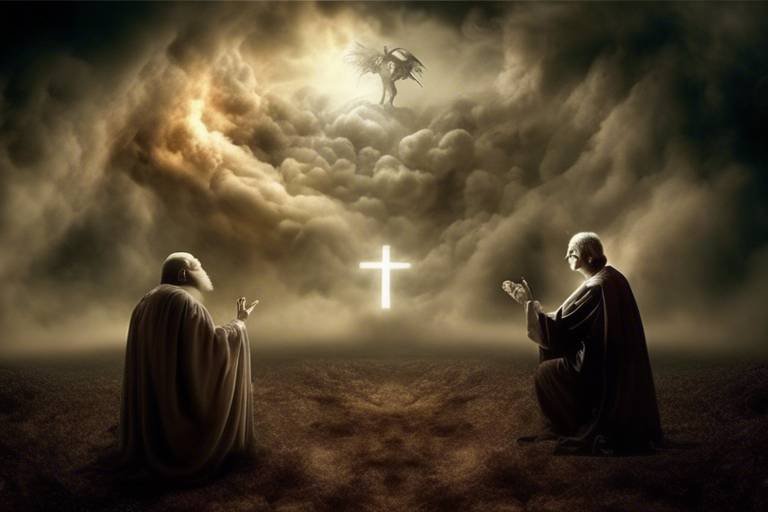Deconstructing the Supernatural: A Metaphysical Study
The concept of the supernatural has intrigued humanity for centuries, serving as a bridge between the known and the unknown. It’s a realm where the ordinary meets the extraordinary, where the laws of nature seem to bend and twist, allowing for phenomena that defy explanation. But what exactly do we mean when we refer to the supernatural? Is it merely a collection of myths and legends, or does it hold a deeper significance in our understanding of existence? In this article, we will embark on a journey to explore the multifaceted nature of the supernatural, examining its implications, interpretations, and significance within metaphysical discussions. We'll delve into various aspects that challenge our conventional understandings of reality, offering fresh perspectives on a topic that has captivated minds throughout history.
To grasp the essence of the supernatural, we must first define what it encompasses. The supernatural is often characterized by events or entities that exist beyond the scope of our natural world. Think of it as the mysterious fog that envelops the familiar landscape of our daily lives, obscuring our vision while simultaneously inviting us to look closer. It challenges our perceptions and invites us to question the very fabric of reality. Philosophers and theologians alike have wrestled with the supernatural, offering various perspectives that shape our understanding. For instance, some argue that the supernatural is a manifestation of divine intervention, while others view it as a psychological construct born from human fears and desires.
Throughout history, different cultures have interpreted the supernatural in myriad ways, reflecting their unique worldviews and societal values. From ancient civilizations to modern societies, the supernatural has played a pivotal role in shaping beliefs and practices. Key events and figures have emerged, influencing how we perceive the unknown. For example, the ancient Greeks viewed the supernatural as an integral part of their mythology, with gods and goddesses interacting with humans in profound ways. This interaction not only explained natural phenomena but also provided moral frameworks for human behavior.
When we delve into the beliefs of ancient civilizations, we find that their myths and legends were rich with supernatural elements. These narratives often served as a means to explain the unexplainable. For instance, the Egyptians believed in a pantheon of gods who governed every aspect of life, from the flooding of the Nile to the afterlife. Such beliefs were not merely stories; they were a way for these civilizations to make sense of their existence and the universe around them. The supernatural was woven into the very fabric of their daily lives, guiding their actions and shaping their destinies.
Exploring specific myths and folklore from various cultures reveals how these narratives reflect societal values and fears related to the supernatural. Take, for example, the myth of Medusa in Greek mythology. Medusa, once a beautiful maiden, was transformed into a monster with snakes for hair as punishment for her vanity. This story serves as a cautionary tale about the dangers of hubris and the unpredictability of the supernatural. Similarly, folklore often contains moral lessons, illustrating how societies have grappled with the unknown and the consequences of human actions.
Major world religions offer profound insights into how the supernatural is perceived. In Christianity, for instance, divine beings and supernatural events are central to the faith. Miracles, such as the resurrection of Jesus, serve as foundational beliefs that challenge our understanding of life and death. In contrast, Eastern religions like Buddhism may interpret the supernatural through the lens of enlightenment and transcendence, viewing it as a state of being rather than a series of miraculous events. These interpretations highlight the diverse ways in which the supernatural shapes religious practices and beliefs across cultures.
As we transition into modern interpretations of the supernatural, we find ourselves at a crossroads between belief and skepticism. Science and technology have dramatically influenced how we view supernatural claims. While some people continue to hold steadfast beliefs in the supernatural, others adopt a more skeptical stance, often seeking empirical evidence to support or debunk these claims. This ongoing dialogue between the supernatural and scientific inquiry raises fascinating questions about the nature of reality and our place within it.
The supernatural prompts us to ponder profound philosophical questions. What does it mean to exist? How do we define reality? These questions become even more complex when we consider supernatural beliefs, which often challenge our understanding of consciousness and existence. For many, the supernatural offers a glimpse into a reality that transcends our physical existence, suggesting that there is more to life than what we can see, touch, or measure. This exploration invites us to reflect on our own beliefs and the ways in which they shape our understanding of the universe.
Supernatural beliefs often influence our existential questions about life, death, and purpose. They shape our individual and collective worldviews, providing frameworks for understanding our existence in a seemingly chaotic universe. For instance, the belief in an afterlife can offer comfort and hope, guiding individuals through the challenges of life. Conversely, skepticism about the supernatural may lead to existential angst, prompting deeper inquiries into the meaning of life and our ultimate fate.
Exploring the relationship between consciousness and the supernatural opens up a realm of possibilities. Some theories suggest that human perception is intricately linked to supernatural experiences, proposing that consciousness itself may be a gateway to understanding the unknown. This connection raises intriguing questions: Are our experiences of the supernatural mere figments of imagination, or do they point to a deeper reality that lies beyond our current understanding?
In the quest to understand the supernatural, science plays a pivotal role. It serves as both a challenger and a supporter of various supernatural theories and beliefs. Scientific inquiry encourages critical thinking and empirical evidence, often leading to skepticism about supernatural claims. However, it also opens doors to new understandings of phenomena that were once deemed purely supernatural. For instance, advances in psychology and neuroscience have shed light on the ways our brains interpret and experience the supernatural, blurring the lines between perception and reality.
The rise of scientific skepticism has significantly influenced public perceptions of the supernatural. As people increasingly rely on empirical evidence, many supernatural claims are scrutinized and often dismissed. This shift has sparked debates about the validity of supernatural beliefs, prompting individuals to reevaluate their understanding of the unknown. Yet, skepticism does not negate the fascination with the supernatural; instead, it invites deeper exploration and understanding of what lies beyond our current knowledge.
Paranormal investigations represent a fascinating intersection between science and the supernatural. Methodologies used in these investigations often aim to apply scientific principles to phenomena that defy explanation. However, the controversies surrounding the evidence of supernatural occurrences highlight the challenges faced by investigators. Are they uncovering genuine mysteries, or are they merely projecting their beliefs onto ambiguous experiences? This ongoing dialogue between science and the supernatural continues to captivate and perplex both skeptics and believers alike.
- What is the supernatural? The supernatural refers to phenomena or entities that exist beyond the natural world and cannot be explained by scientific laws.
- How have historical perspectives shaped our understanding of the supernatural? Different cultures and historical contexts have interpreted the supernatural in diverse ways, influencing beliefs and practices throughout time.
- What role does science play in understanding the supernatural? Science serves as both a challenger and supporter of supernatural claims, encouraging critical thinking while also opening doors to new understandings.
- How do supernatural beliefs influence existential questions? Supernatural beliefs often shape our views on life, death, and purpose, providing frameworks for understanding our existence.

The Nature of the Supernatural
The concept of the supernatural has intrigued humanity for centuries, serving as a bridge between the known and the unknown. At its core, the supernatural refers to phenomena or entities that lie beyond the natural world, defying the laws of physics and the limitations of our understanding. Think of it as the realm where magic meets reality, where the impossible becomes possible. But what exactly characterizes the supernatural, and how does it contrast with the natural world we inhabit?
To grasp the nature of the supernatural, we must first explore its defining characteristics. Often, supernatural phenomena are associated with divine beings, such as gods, spirits, or other entities that exist outside the realm of human experience. These beings are frequently depicted as having powers that transcend ordinary human capabilities—think of the lightning bolt thrown by Zeus or the ethereal guidance of a guardian angel. Moreover, supernatural events often challenge our understanding of time and space, presenting scenarios where the normal rules simply do not apply. For example, the idea of a ghost appearing in a haunted house raises questions about the very fabric of reality and existence.
From a philosophical standpoint, the supernatural compels us to reconsider our definitions of existence and reality. It pushes us to ask profound questions: What is the nature of reality? Is there more to our existence than what we can see and touch? Philosophers throughout history have grappled with these questions, offering various interpretations that shape our understanding of the supernatural. Some argue that the supernatural is merely a projection of human fears and desires, while others posit that it represents a deeper truth about the universe that we have yet to comprehend.
When we examine the supernatural, we also encounter the tension between belief and skepticism. For many, belief in the supernatural is rooted in personal experiences or cultural traditions. These beliefs can serve as a source of comfort, providing explanations for life's mysteries that science alone cannot address. On the other hand, skeptics argue that supernatural claims lack empirical evidence and often rely on anecdotal accounts or unverified testimonies. This ongoing debate raises the question: can we ever truly understand the supernatural, or is it destined to remain an enigma?
In summary, the nature of the supernatural is complex and multifaceted. It encompasses a wide range of phenomena, from divine interventions to ghostly apparitions, each challenging our perceptions of reality. As we continue to explore the supernatural, we find ourselves standing at the crossroads of faith and reason, where every inquiry leads to more questions than answers. It's a fascinating journey that invites us to ponder the very essence of existence itself.
- What is the supernatural? The supernatural refers to phenomena or entities that exist beyond the natural world, often defying the laws of physics.
- How does the supernatural differ from the natural world? The supernatural involves elements that cannot be explained by natural laws, whereas the natural world is governed by observable scientific principles.
- Are supernatural experiences real? While many people report supernatural experiences, their validity is often debated, with skeptics calling for empirical evidence.
- What role does culture play in shaping supernatural beliefs? Cultural narratives, myths, and religious practices significantly influence how societies interpret and understand supernatural phenomena.

Historical Perspectives
The supernatural has been a cornerstone of human culture and thought throughout history, shaping beliefs, traditions, and societal norms. From the earliest civilizations to modern society, the way people interpret the supernatural has evolved, reflecting their understanding of existence and the cosmos. This section takes a deep dive into how various cultures and historical contexts have interpreted supernatural phenomena, highlighting key events and influential figures that have molded these beliefs.
In ancient times, the supernatural was often interwoven with the fabric of daily life. Civilizations such as the Egyptians, Greeks, and Mesopotamians crafted elaborate mythologies that explained the world around them. These myths were not just stories; they were frameworks for understanding life's mysteries, offering explanations for natural events and human experiences. For example, the Egyptians believed in a pantheon of gods, each responsible for different aspects of life and nature, which provided a sense of order and purpose in a chaotic world.
When we examine ancient civilizations, we see how their beliefs regarding the supernatural were deeply rooted in their understanding of existence. The Greeks, for instance, personified natural forces through deities like Zeus and Poseidon, who governed the skies and seas, respectively. These gods were not merely distant figures; they were involved in human affairs, reflecting the belief that the supernatural was intertwined with the natural world. This connection is evident in the epic tales of Homer, where divine intervention often alters the course of human events.
Mythology and folklore serve as windows into the supernatural beliefs of ancient cultures. These narratives often reveal societal values, fears, and hopes. For instance, in Norse mythology, the concept of Ragnarok represents not only the end of the world but also the cyclical nature of existence—a reminder that destruction can lead to rebirth. Similarly, the folklore of various cultures often includes tales of spirits and otherworldly beings, which serve to explain the unexplainable and instill moral lessons. Such stories have been passed down through generations, continuing to influence contemporary beliefs and practices.
As civilizations progressed, so did their interpretations of the supernatural, particularly through the lens of religion. Major world religions, such as Christianity, Islam, and Hinduism, have their own unique perspectives on the supernatural. These religions often depict divine beings and supernatural events as central to their teachings. For example, the miracles of Jesus in the New Testament illustrate the belief in a supernatural force that can intervene in the natural order. Similarly, in Hinduism, the concept of karma and reincarnation reflects a belief in a cosmic order governed by supernatural principles.
Fast forward to the modern era, and we find ourselves in a society that grapples with the implications of science and technology on supernatural beliefs. While ancient cultures relied heavily on myths and religious interpretations, contemporary society often seeks empirical evidence to validate supernatural claims. This shift has sparked debates about the validity of supernatural experiences, with many individuals caught between skepticism and faith. The rise of paranormal investigations, for instance, highlights how modern interpretations attempt to reconcile the supernatural with scientific inquiry.
| Civilization | Key Supernatural Beliefs | Influential Texts |
|---|---|---|
| Ancient Egypt | Polytheism, afterlife beliefs | The Book of the Dead |
| Ancient Greece | Gods influencing human fate | The Iliad, The Odyssey |
| Norse Culture | Ragnarok, fate of gods and humans | Poetic Edda |
| Christianity | Miracles, divine intervention | The Bible |
| Hinduism | Karma, reincarnation | Bhagavad Gita |
In summary, the historical perspectives on the supernatural reveal a rich tapestry of beliefs that have evolved over time. From ancient civilizations that wove the supernatural into the very fabric of their existence to modern interpretations that challenge these age-old notions, the exploration of the supernatural continues to be a fascinating journey. As we move forward, it is essential to recognize how these historical beliefs shape our current understanding and interpretations of the supernatural.
- What is the supernatural? The supernatural refers to phenomena or entities that exist beyond the laws of nature, often associated with divine beings, spirits, or otherworldly events.
- How have ancient civilizations interpreted the supernatural? Ancient civilizations often personified natural forces through deities and created myths that explained their existence, providing a framework for understanding life and the universe.
- What role do religions play in understanding the supernatural? Religions provide narratives and doctrines that explain supernatural phenomena, often depicting divine beings and events that shape the moral and ethical framework of their followers.
- How do modern views on the supernatural differ from historical perspectives? Modern views often seek empirical evidence and scientific explanations for supernatural claims, contrasting with historical beliefs that relied heavily on myths and religious interpretations.

Ancient Civilizations
The beliefs surrounding the supernatural in ancient civilizations were as diverse as the cultures themselves, each weaving intricate tapestries of myth, legend, and ritual that shaped their understanding of existence and the divine. From the awe-inspiring pyramids of Egypt to the enigmatic ruins of the Mayans, the supernatural played a pivotal role in how these societies interpreted their world. Can you imagine a time when the sun was not just a celestial body but a living god? Ancient Egyptians believed that the sun god Ra traveled through the underworld each night, only to be reborn each morning. This cyclical view of life and death illustrates how the supernatural was deeply intertwined with their daily lives and agricultural practices.
In Mesopotamia, the cradle of civilization, the supernatural was equally significant. The Sumerians, for example, created a pantheon of gods who governed every aspect of life, from the fertility of the land to the success of their military endeavors. Each city-state had its own patron deity, and the relationship between humans and these divine beings was maintained through rituals and offerings. The famous Epic of Gilgamesh, one of the earliest works of literature, explores themes of mortality and the quest for immortality, showcasing how the supernatural was a lens through which ancient peoples examined their own existence.
Similarly, the ancient Greeks and Romans personified natural elements and phenomena into gods and goddesses, creating a rich mythology that explained the unexplainable. For instance, Zeus, the king of the gods, wielded thunderbolts and governed the sky, while Poseidon ruled the seas. These deities were not merely figments of imagination; they represented the forces of nature and the human condition, embodying the hopes, fears, and moral dilemmas faced by society. The tales of Hercules and Odysseus are not just stories of heroism; they reflect the struggle between human beings and the supernatural, an ongoing battle that resonates even today.
As we delve deeper into the beliefs of ancient civilizations, we find that their myths and legends were not just entertaining tales but essential frameworks for understanding their existence. The supernatural provided answers to questions about life, death, and the universe, serving as a guide for ethical behavior and societal norms. For instance, the concept of fate in Greek mythology, often personified by the Moirai or Fates, emphasized the belief that one's destiny was predetermined by divine forces. This belief system fostered a sense of humility and acceptance among individuals, as they navigated the complexities of life.
In conclusion, the supernatural was not merely an abstract concept for ancient civilizations; it was a vital part of their identity and worldview. Through their myths, rituals, and beliefs, these cultures sought to explain the mysteries of existence, offering insights that continue to influence modern thought. As we reflect on these ancient narratives, one can't help but wonder: how do our current beliefs about the supernatural compare to those of our ancestors? The exploration of these themes invites us to reconsider our own understanding of reality and the unseen forces that may shape our lives.
- What role did the supernatural play in ancient civilizations?
The supernatural was integral to ancient civilizations, influencing their myths, rituals, and societal norms, providing explanations for natural phenomena and existential questions.
- How did mythology reflect societal values in ancient cultures?
Mythology often mirrored the values, fears, and aspirations of a society, serving as a moral compass and guiding ethical behavior through the narratives of gods and heroes.
- Are there similarities between ancient and modern supernatural beliefs?
Yes, many modern beliefs about the supernatural, such as the existence of spirits or cosmic forces, echo themes found in ancient mythologies, suggesting a timeless human fascination with the unknown.

Mythology and Folklore
Mythology and folklore serve as the rich tapestry of cultural narratives that reflect the beliefs, values, and fears of societies throughout history. These stories, often passed down through generations, provide insight into how ancient peoples understood their world and the supernatural forces that they believed influenced their lives. From the thunderous roars of gods in ancient Greece to the quiet whispers of spirits in Native American traditions, mythology and folklore encapsulate the essence of human experience intertwined with the supernatural.
In many ways, mythology can be seen as the collective unconscious of a culture, a shared set of symbols and narratives that resonate with the human experience. For instance, the Greek pantheon, with deities like Zeus, Athena, and Hades, not only represents supernatural beings but also embodies the complexities of human emotions and societal dynamics. These myths often served practical purposes, such as explaining natural phenomena or providing moral lessons. The tale of Prometheus, who stole fire from the gods to give to humanity, illustrates themes of rebellion, sacrifice, and the quest for knowledge, which are still relevant today.
Folklore, on the other hand, often includes the stories of ordinary people and their interactions with the supernatural. These narratives can be cautionary tales, like those of the Will-o'-the-wisps leading travelers astray, or heroic sagas that celebrate the triumph of good over evil. Folklore can also reflect societal fears, such as the vampire legends that emerged in Eastern Europe, which were often rooted in misunderstandings about disease and death. These stories, while fantastical, reveal a deep-seated need to make sense of the unknown and to provide a framework for understanding the complexities of life and death.
Moreover, the role of mythology and folklore extends beyond mere entertainment; they are vital in shaping cultural identity. For example, the Hindu epic Ramayana is not just a story about the hero Rama and his quest to rescue his wife Sita; it is a cornerstone of Indian culture that teaches values such as duty, honor, and devotion. Similarly, the Native American legends, often centered around nature and the interconnectedness of all living things, serve to reinforce cultural identity and environmental stewardship.
As we explore these narratives, we can see that they are not static; they evolve over time, adapting to contemporary contexts while retaining their core messages. This adaptability allows mythology and folklore to remain relevant, resonating with modern audiences who find parallels between ancient tales and current societal issues. For instance, the resurgence of interest in myth-based media, such as movies and television shows, highlights how these ancient stories continue to captivate and inspire.
In conclusion, mythology and folklore are not merely relics of the past; they are living narratives that continue to shape our understanding of the supernatural and our place in the universe. They encourage us to ponder existential questions, challenge our perceptions of reality, and explore the profound connections between humanity and the divine. As we delve deeper into these stories, we uncover layers of meaning that enrich our lives and expand our understanding of the world around us.
- What is the difference between mythology and folklore? Mythology typically refers to the traditional stories of gods and heroes that explain the beliefs of a culture, while folklore encompasses a wider range of tales, including legends, fairy tales, and oral traditions related to everyday life.
- How do myths and folklore influence modern culture? Myths and folklore continue to influence literature, film, and art, providing archetypes and themes that resonate with contemporary audiences.
- Why are myths and folklore important? They help us understand cultural identities, societal values, and human experiences, offering insights into how different cultures interpret the supernatural and their place in the world.

Religious Interpretations
Throughout history, religion has been a primary lens through which humanity interprets the supernatural. Each major world religion offers its own unique perspective on divine beings, supernatural events, and the metaphysical realm that transcends our everyday experience. It's fascinating to consider how these interpretations not only shape individual beliefs but also influence entire cultures. For instance, in Christianity, the concept of miracles—events that defy natural laws—serves as a testament to God's omnipotence. These miraculous occurrences, such as the resurrection of Jesus, are seen as pivotal moments that validate faith and provide a glimpse into the supernatural.
In contrast, Hinduism offers a rich tapestry of supernatural beliefs, encompassing a pantheon of gods and goddesses, each representing various aspects of life and the universe. The stories of these deities often involve miraculous feats, such as Lord Krishna lifting a mountain to protect his devotees. Such narratives not only illustrate the divine's intervention in human affairs but also reflect the cultural values and moral lessons of the time. This intertwining of the supernatural with everyday life highlights how religious interpretations can provide comfort and a sense of purpose.
Moreover, Islam emphasizes the significance of the supernatural through the concept of Jinn, beings created from smokeless fire, who exist in a parallel realm. They can influence human affairs, and their existence is acknowledged in the Qur'an. This belief in Jinn illustrates how Islam incorporates supernatural elements into its theological framework, offering followers a way to understand the unseen forces that affect their lives.
It's important to note that religious interpretations of the supernatural often serve to address fundamental human questions. For example, many religions provide explanations for life after death, the nature of good and evil, and the purpose of existence. These interpretations can vary widely, leading to a rich diversity of beliefs. To illustrate this diversity, consider the table below, which summarizes key aspects of supernatural beliefs across several major religions:
| Religion | Supernatural Beliefs | Key Figures |
|---|---|---|
| Christianity | Miracles, resurrection, angels | Jesus Christ, Saints |
| Hinduism | Deities, reincarnation, karma | Brahma, Vishnu, Shiva |
| Islam | Angels, Jinn, divine intervention | Prophet Muhammad, Angels (Gabriel) |
| Buddhism | Enlightenment, supernatural beings | Buddha, Bodhisattvas |
As we can see, these interpretations not only serve to explain the supernatural but also connect deeply with the cultural and ethical dimensions of each religion. They provide a framework for understanding the mysteries of existence and the forces that govern our lives. By exploring these religious interpretations, we can gain a greater appreciation for the diverse ways in which humanity grapples with the unknown.
In conclusion, the supernatural is a multifaceted concept that is deeply embedded in religious belief systems. Whether viewed through the lens of miracles, divine beings, or supernatural events, these interpretations enrich our understanding of the metaphysical and highlight the profound questions that continue to resonate through the ages.
- What are the main supernatural beliefs in Christianity?
Christianity emphasizes miracles, the resurrection of Jesus, and the existence of angels and demons. - How does Hinduism view the supernatural?
Hinduism features a rich pantheon of gods and goddesses, reincarnation, and the law of karma. - What role do supernatural beliefs play in Islam?
Islam includes beliefs in angels, Jinn, and the divine intervention of God in human affairs. - Can supernatural beliefs influence modern society?
Yes, they can shape cultural values, ethical frameworks, and personal worldviews.

Modern Interpretations
In today's fast-paced world, the supernatural has taken on new meanings, often influenced by technological advancements and scientific discoveries. As we navigate through the complexities of modern life, our interpretations of the supernatural have evolved, reflecting a blend of skepticism and curiosity. Now, more than ever, people are questioning the boundaries between what is real and what is not. Have you ever found yourself wondering if there might be more to our existence than meets the eye? This is where the fascinating interplay between the supernatural and modernity comes into play.
One of the significant shifts in our understanding of the supernatural is the impact of science. While ancient civilizations often viewed the supernatural as a direct influence on their daily lives, the scientific revolution has encouraged a more analytical approach. Today, many individuals are inclined to seek rational explanations for phenomena previously attributed to supernatural forces. This shift has led to a rise in scientific skepticism, where people demand empirical evidence before accepting supernatural claims. For instance, ghost sightings or unexplained occurrences are now often scrutinized through the lens of psychology or environmental factors.
However, this does not mean that belief in the supernatural has diminished. In fact, the advent of technology has given rise to new forms of supernatural interpretations. The proliferation of social media and online platforms has created communities where people share their supernatural experiences, often blurring the lines between reality and fiction. This phenomenon can be likened to a modern-day myth-making, where personal stories and collective narratives shape our understanding of the supernatural. People are more connected than ever, allowing for a rich tapestry of beliefs to flourish in the digital age.
Moreover, popular culture plays a crucial role in shaping modern interpretations of the supernatural. Movies, television shows, and literature often explore themes of the supernatural, from horror to fantasy, capturing our imagination and provoking thought. Consider how shows like The X-Files or Stranger Things have not only entertained but also sparked discussions about the existence of otherworldly beings and dimensions. These narratives often reflect societal fears and desires, illustrating how the supernatural continues to resonate with contemporary audiences.
Interestingly, the modern interpretation of the supernatural also includes a growing acceptance of spirituality outside traditional religious frameworks. Many individuals are exploring alternative beliefs, such as New Age spirituality, which often incorporates elements of the supernatural. Practices like meditation, energy healing, and astrology have gained popularity, suggesting a desire for deeper connections beyond the material world. This trend highlights a shift in how people seek meaning and understanding in their lives, often turning to the supernatural for guidance.
In summary, the modern interpretations of the supernatural are as diverse as they are dynamic. They encompass a wide range of beliefs, influenced by science, technology, and cultural narratives. As we continue to grapple with questions about existence and reality, the supernatural remains a compelling aspect of the human experience, inviting us to explore the mysteries that lie beyond our understanding.
- What is the supernatural? The supernatural refers to phenomena or entities that exist beyond the natural world, often associated with divine beings, ghosts, and unexplained occurrences.
- How has science influenced beliefs in the supernatural? Science has encouraged skepticism and critical thinking, prompting people to seek rational explanations for phenomena traditionally attributed to the supernatural.
- Are modern interpretations of the supernatural still relevant? Yes! Modern interpretations reflect a blend of traditional beliefs and contemporary influences, demonstrating that the supernatural continues to resonate with people today.
- What role does popular culture play in shaping beliefs about the supernatural? Popular culture, through films, books, and television, explores supernatural themes that captivate audiences and provoke discussions about the nature of reality.

Philosophical Implications
The exploration of the supernatural is not just a journey into the unknown; it opens up a vast landscape of philosophical implications that challenge our understanding of existence, reality, and consciousness. When we ponder the supernatural, we are often confronted with questions that probe the very essence of what it means to be human. What is our place in the universe? Is there a purpose to our existence, or are we mere spectators in a cosmic play? These existential questions are not just the musings of poets and philosophers; they are central to the human experience and are intricately tied to our beliefs about the supernatural.
Consider the age-old question of life after death. Many supernatural beliefs offer comforting narratives about what happens when we die, suggesting that our consciousness transcends our physical form. This idea can be both liberating and terrifying. It raises profound questions about morality, accountability, and the nature of the soul. If we believe in a supernatural realm, does that imply a higher moral order that governs our actions? Or is morality simply a human construct, shaped by societal norms and individual experiences? Such questions illustrate the complex interplay between supernatural beliefs and philosophical inquiry.
Furthermore, the relationship between consciousness and the supernatural is a topic ripe for exploration. Some theories suggest that our consciousness might be a gateway to supernatural experiences, hinting at a deeper connection between human perception and the unseen forces that shape our reality. This perspective challenges the traditional materialist view that consciousness is merely a byproduct of biological processes. Instead, it posits that our awareness might be intertwined with a broader, more mysterious reality that transcends our understanding.
To better understand these philosophical implications, we can examine a few key concepts:
- Existentialism: This philosophy emphasizes individual existence, freedom, and choice, often grappling with the absurdity of life. Supernatural beliefs can provide a framework for understanding our place in the universe.
- Phenomenology: This approach focuses on the structures of experience and consciousness. It suggests that our perceptions of the supernatural are valid experiences that deserve exploration and understanding.
- Metaphysics: This branch of philosophy deals with the fundamental nature of reality. Questions about the existence of supernatural beings or realms push us to reconsider our definitions of reality itself.
In conclusion, the philosophical implications of the supernatural extend far beyond mere belief systems. They invite us to engage in a deeper inquiry about existence, consciousness, and the very nature of reality. As we navigate these complex questions, we find that the supernatural is not just an abstract concept; it is a lens through which we can explore the most profound aspects of our human experience.
Q: What is the supernatural?
A: The supernatural refers to phenomena or entities that exist beyond the natural world, often associated with divine beings, spirits, or forces that cannot be explained by scientific understanding.
Q: How do philosophical perspectives shape our understanding of the supernatural?
A: Philosophical perspectives challenge us to question the nature of existence, morality, and consciousness in relation to supernatural beliefs, prompting deeper inquiry into our place in the universe.
Q: Can science and the supernatural coexist?
A: While science relies on empirical evidence and skepticism, many people find ways to reconcile their supernatural beliefs with scientific understanding, often viewing them as complementary rather than contradictory.
Q: What role does consciousness play in supernatural experiences?
A: Some theories propose that consciousness may connect us to supernatural experiences, suggesting that our awareness could be intertwined with a broader reality that goes beyond our physical existence.

Existential Questions
The realm of the supernatural is not just a collection of bizarre tales or unexplained phenomena; it fundamentally challenges our understanding of existence itself. When we ponder the supernatural, we often find ourselves grappling with profound that touch the core of what it means to be human. Questions like, "What happens after we die?" or "Is there a greater purpose to our lives?" are often intertwined with supernatural beliefs. These inquiries can lead to a deeper exploration of our own consciousness and reality. It's almost as if the supernatural serves as a mirror, reflecting our innermost fears and hopes.
Consider the idea of life after death. Many cultures have rich traditions and beliefs about what occurs when we pass from this world. From the ancient Egyptians' elaborate burial practices designed to ensure safe passage to the afterlife, to modern-day beliefs in reincarnation or heaven and hell, these narratives provide comfort and context to our existential dread. They help us make sense of our mortality and the inevitable end that awaits us all. But does the supernatural offer genuine answers, or does it simply pacify our fears?
Moreover, the supernatural often complicates our understanding of purpose. If we believe in a divine plan or a higher power, does that mean our lives are predetermined? Or do we possess the free will to carve our own paths? This tug-of-war between destiny and autonomy is a classic existential dilemma, and the supernatural adds layers of complexity to it. When we think about the existence of supernatural beings or forces, we might wonder if they play a role in our choices or if we are left to navigate our lives entirely on our own.
As we delve deeper into these existential questions, we must also consider how they shape our collective worldview. For instance, in times of crisis or uncertainty, many people turn to supernatural explanations as a way to cope. This phenomenon is not merely a psychological crutch; it can significantly influence societal norms and values. The belief in a higher power or supernatural justice can foster a sense of community and shared purpose, but it can also lead to division and conflict when differing beliefs clash.
In essence, the supernatural acts as a catalyst for our existential inquiries, prompting us to confront the mysteries of life, death, and everything in between. Whether we find solace in these beliefs or question their validity, they undeniably shape our perceptions of reality. As we navigate through life, these questions linger, urging us to explore further and seek understanding in a world that often feels chaotic and unpredictable.
- What are existential questions? Existential questions are fundamental inquiries about existence, purpose, and the nature of reality, often prompted by the contemplation of life and death.
- How does the supernatural influence our understanding of existence? The supernatural provides frameworks for understanding life's mysteries, often shaping beliefs about life after death and the purpose of our existence.
- Can belief in the supernatural affect mental health? Yes, belief in the supernatural can provide comfort and meaning, but it can also lead to anxiety or conflict when beliefs are challenged.

Consciousness and Reality
When we dive into the intriguing relationship between consciousness and reality, we find ourselves at the crossroads of philosophy, science, and spirituality. Imagine consciousness as a vibrant tapestry, woven from the threads of our experiences, thoughts, and perceptions. This tapestry shapes our understanding of reality, influencing how we interpret the world around us. But what does it mean to say that our consciousness creates or alters reality? Is reality a fixed entity, or is it malleable, shaped by our individual and collective experiences?
Philosophers and scientists alike have long pondered these questions. Theories such as idealism suggest that reality is fundamentally mental, proposing that our perceptions play a critical role in shaping the world we experience. In contrast, materialism posits that reality exists independently of our consciousness, with the physical world being the primary reality, while consciousness is merely a byproduct of brain activity. This dichotomy raises essential questions: If our consciousness can influence our reality, how does that change our understanding of existence?
Consider the concept of quantum mechanics, which introduces a fascinating perspective on consciousness and reality. Some interpretations suggest that the act of observation affects the behavior of particles, hinting at a deeper connection between consciousness and the fabric of reality itself. This leads to the idea that our thoughts and beliefs might not just be passive reflections of the world but active participants in shaping it. Could it be that our perceptions create a unique version of reality, tailored to our individual consciousness?
To explore this further, let's look at some theories that illustrate the connection between consciousness and reality:
- Phenomenology: This philosophical approach emphasizes the importance of subjective experience, arguing that reality is constructed through individual perceptions.
- Panpsychism: This theory posits that consciousness is a fundamental aspect of all matter, suggesting that everything has some degree of consciousness, which influences its reality.
- Simulation Hypothesis: This provocative idea suggests that our reality might be an artificial simulation, with consciousness being a key component in navigating this simulated existence.
As we navigate these theories, it's essential to recognize the implications for our understanding of existence. If consciousness indeed shapes reality, we might hold more power over our experiences than we previously thought. This realization can be both exhilarating and daunting, as it places the responsibility of perception squarely on our shoulders. Are we, then, the architects of our own realities, capable of altering our experiences through the lens of our consciousness?
In conclusion, the relationship between consciousness and reality is a complex and multifaceted topic that invites ongoing exploration. Whether through philosophical inquiry, scientific investigation, or spiritual reflection, understanding this connection can lead us to profound insights about our existence and the nature of the universe. As we continue to unravel these mysteries, we may find that the boundaries between consciousness and reality are not as rigid as they seem, opening the door to new possibilities and deeper understanding.
- What is the relationship between consciousness and reality?
Consciousness influences how we perceive and interpret reality, suggesting that our experiences shape our understanding of the world around us. - Can consciousness alter reality?
Some theories propose that consciousness can affect reality, particularly in contexts like quantum mechanics, where observation may change the behavior of particles. - What are some philosophical theories related to consciousness and reality?
Phenomenology, panpsychism, and the simulation hypothesis are a few theories that explore the intricate relationship between consciousness and reality.

The Role of Science
When we dive into the intriguing realm of the supernatural, one cannot overlook the vital role that science plays in shaping our understanding and beliefs. Science, with its rigorous methodologies and unwavering commitment to empirical evidence, often stands as a counterbalance to the more mystical interpretations of reality. It prompts us to ask: can the supernatural be explained, or is it destined to remain an enigma beyond the grasp of human comprehension?
At its core, science seeks to unravel the mysteries of the universe through observation, experimentation, and validation. This pursuit has led to significant advancements in our understanding of the natural world, but what happens when we encounter phenomena that defy conventional explanation? Here, the intersection of science and the supernatural becomes particularly fascinating. While some may argue that the supernatural is merely a product of human imagination or cultural storytelling, others insist that there are experiences and events that transcend scientific explanation.
To illustrate this interplay, consider the following points:
- Scientific Inquiry: Scientists employ rigorous methods to investigate claims of the supernatural, often leading to surprising discoveries about human psychology, environmental factors, and even social dynamics.
- Critical Thinking: The rise of scientific skepticism encourages individuals to question extraordinary claims, urging them to seek evidence before accepting supernatural explanations.
- Technological Advancements: With modern technology, such as infrared cameras and digital voice recorders, researchers can document purported supernatural events, leading to debates about the authenticity of such phenomena.
Yet, despite these scientific endeavors, many still find themselves drawn to the supernatural. This allure can be attributed to our innate curiosity and desire for meaning in a complex world. For instance, the phenomenon of near-death experiences (NDEs) has sparked significant interest among both scientists and spiritual seekers. While some researchers attempt to explain NDEs through neurological processes, others argue that these experiences provide profound insights into the nature of consciousness and existence.
Moreover, the field of paranormal investigations has gained traction, blending scientific methods with an exploration of the unknown. Investigators often use a variety of tools, including electromagnetic field (EMF) meters and thermal imaging cameras, to gather data on reported hauntings or supernatural occurrences. However, the interpretation of this data remains contentious, as skeptics argue that such tools can easily yield misleading results due to environmental variables or human perception. This ongoing debate highlights the delicate balance between belief and skepticism, urging us to consider both perspectives.
In conclusion, the relationship between science and the supernatural is complex and multifaceted. While science provides a framework for understanding our world, it also challenges us to confront the mysteries that lie beyond our current knowledge. As we continue to explore these fascinating intersections, we may find that the quest for understanding the supernatural is as much about the journey as it is about the destination. So, the next time you encounter a supernatural claim or experience, remember to approach it with both an open mind and a critical eye.
- Can science explain supernatural phenomena? Science attempts to explain many phenomena through observation and evidence, but some experiences may remain beyond its current understanding.
- What is the role of skepticism in supernatural claims? Skepticism encourages critical thinking and demands evidence before accepting extraordinary claims, fostering a more informed perspective.
- Are paranormal investigations scientifically valid? While some methods used in paranormal investigations draw from scientific principles, the interpretations of results can be highly subjective and controversial.

Scientific Skepticism
Scientific skepticism is not just a buzzword; it’s a fundamental aspect of how we approach claims about the supernatural. Imagine walking into a room filled with shadows and whispers, where every corner seems to hold a secret. Now, picture a scientist stepping in with a flashlight, determined to illuminate the truth. This is the essence of scientific skepticism—it’s about questioning, investigating, and seeking evidence before accepting extraordinary claims.
At its core, scientific skepticism is grounded in critical thinking and the scientific method. It encourages individuals to ask questions like, “What evidence supports this claim?” and “Are there alternative explanations?” This approach is particularly important when examining supernatural phenomena, which often defy our understanding of the natural world. For instance, reports of ghost sightings or paranormal activities can be thrilling, but without rigorous investigation, they remain mere anecdotes. By applying skepticism, we can separate sensational stories from verifiable facts.
One of the key figures in the realm of scientific skepticism is Carl Sagan, who famously stated, “Extraordinary claims require extraordinary evidence.” This principle serves as a guiding light for skeptics, reminding us that just because something is unusual or unexplained doesn’t mean it’s supernatural. In the world of science, claims must be substantiated by empirical evidence, reproducible results, and peer review. This rigorous scrutiny helps to prevent the spread of misinformation and ensures that our understanding of reality is based on solid ground.
However, skepticism doesn’t mean outright dismissal of all supernatural claims. Instead, it invites open-mindedness while simultaneously demanding evidence. For example, when investigating phenomena like near-death experiences or UFO sightings, skeptics will often explore psychological explanations, cultural influences, and even environmental factors that could contribute to these occurrences. This multifaceted approach helps to paint a fuller picture of what might be happening, rather than jumping to supernatural conclusions.
Interestingly, the rise of technology has added another layer to scientific skepticism. With advancements in tools and methodologies, researchers are better equipped to investigate claims of the supernatural. For instance, the use of infrared cameras and electromagnetic field detectors in paranormal investigations allows for more thorough examinations of reported hauntings. Yet, even with these tools, the need for skepticism remains paramount. The data collected must be analyzed critically, and conclusions drawn should be based on the weight of the evidence rather than personal beliefs or emotions.
In conclusion, scientific skepticism serves as a necessary counterbalance to the allure of the supernatural. It encourages us to remain curious yet cautious, to explore the unknown while demanding proof. By adopting a skeptical mindset, we not only protect ourselves from deception but also enrich our understanding of the world around us. Who knows? In the pursuit of truth, we may uncover more than we ever imagined.
- What is scientific skepticism?
Scientific skepticism is an approach that emphasizes questioning claims and seeking evidence before accepting them as true, particularly in the context of supernatural phenomena.
- Why is skepticism important in supernatural claims?
Skepticism is crucial because it helps differentiate between sensational stories and verifiable facts, ensuring that our beliefs are based on solid evidence.
- How does technology impact scientific skepticism?
Advancements in technology provide researchers with better tools to investigate supernatural claims, but the need for critical analysis remains essential.

Paranormal Investigations
When it comes to the world of the supernatural, stand as a fascinating intersection between skepticism and belief. These investigations often aim to uncover evidence of phenomena that defy the laws of nature as we understand them. Think of it as a detective story where the clues are ethereal and the suspects are spirits or unexplained occurrences. Investigators typically employ a variety of tools and techniques to explore claims of the paranormal, ranging from ghost sightings to unexplained noises.
One of the most common approaches in paranormal investigations is the use of scientific equipment. This includes devices such as electromagnetic field (EMF) meters, infrared thermometers, and digital voice recorders. Each of these tools serves a specific purpose:
| Equipment | Purpose |
|---|---|
| EMF Meter | Detects electromagnetic fields that may indicate paranormal activity. |
| Infrared Thermometer | Measures temperature fluctuations, often associated with ghostly presences. |
| Digital Voice Recorder | Captures Electronic Voice Phenomena (EVP), which are believed to be voices from the beyond. |
Moreover, investigators often conduct their work in locations known for their supernatural claims, such as abandoned buildings, battlefields, or historic sites. The atmosphere in these places can be charged with a sense of history and mystery, making them prime candidates for exploration. But what drives people to engage in these investigations? Is it the thrill of the unknown, the desire to prove skeptics wrong, or perhaps a deep-seated belief in the supernatural?
Despite the allure of these investigations, they are not without controversy. Critics argue that many paranormal claims lack empirical support and that the findings of investigations are often anecdotal at best. Scientific skepticism plays a crucial role in this discourse. It encourages a critical approach to claims of the supernatural, urging investigators and the public alike to demand rigorous evidence before accepting extraordinary assertions. This skepticism is vital; it acts as a counterbalance to the often sensationalized narratives that surround paranormal phenomena.
Additionally, the methods employed in paranormal investigations can vary widely. Some teams adhere to strict scientific protocols, while others may lean towards more intuitive practices, such as mediumship or spiritual communication. This divergence raises an important question: can the supernatural be studied scientifically, or does it exist outside the realm of empirical inquiry? The answer is not straightforward, and it often depends on one’s perspective.
In recent years, the rise of technology has further complicated the landscape of paranormal investigations. With the advent of smartphones, social media, and advanced imaging techniques, the way we document and share paranormal experiences has transformed dramatically. Investigators can now broadcast live from haunted locations, allowing audiences to engage with the experience in real-time. This has not only increased public interest but has also led to a proliferation of amateur investigators, each equipped with their own tools and theories.
In conclusion, paranormal investigations serve as a compelling lens through which we can examine our beliefs about the supernatural. They challenge us to consider the unknown and the unexplained, and they invite us to question our understanding of reality itself. Whether one approaches these investigations with a skeptical eye or a belief in the supernatural, the journey into the unknown continues to captivate and intrigue us all.
- What is a paranormal investigation? A paranormal investigation is an inquiry into claims of supernatural phenomena, often using various tools and techniques to gather evidence.
- What tools are commonly used in paranormal investigations? Investigators may use EMF meters, infrared thermometers, and digital voice recorders to detect and document paranormal activity.
- Are paranormal investigations scientifically valid? While some investigators use scientific methods, many claims lack empirical support, leading to ongoing debates between skeptics and believers.
- How has technology impacted paranormal investigations? Technology has transformed the way investigations are conducted and shared, allowing for real-time engagement and documentation of experiences.
Frequently Asked Questions
-
What is the supernatural?
The supernatural refers to phenomena or entities that are beyond the natural world and cannot be explained by natural laws. It encompasses things like ghosts, deities, and otherworldly experiences that challenge our understanding of reality.
-
How do different cultures interpret the supernatural?
Cultures around the world have unique interpretations of the supernatural, often shaped by their historical contexts and belief systems. For example, ancient civilizations created myths that explained natural events through supernatural beings, while modern societies may blend scientific reasoning with spiritual beliefs.
-
What role does mythology play in understanding the supernatural?
Mythology serves as a lens through which we can view the supernatural. It reflects societal values, fears, and aspirations, providing narratives that help individuals make sense of their existence and the mysteries of life.
-
How do major religions view the supernatural?
Major world religions often incorporate supernatural elements, such as divine beings and miraculous events, into their teachings. These beliefs can significantly influence followers' worldviews and practices, offering explanations for life's big questions.
-
What are some modern interpretations of the supernatural?
In contemporary society, views on the supernatural have evolved, with many people balancing scientific understanding with personal beliefs. The rise of technology and critical thinking has led to a more skeptical approach towards supernatural claims, yet interest in paranormal phenomena remains strong.
-
How does philosophy intersect with the supernatural?
Philosophical discussions about the supernatural often revolve around existential questions concerning life, death, and consciousness. These inquiries can shape individual and collective beliefs, influencing how we perceive our existence and the universe.
-
What is scientific skepticism regarding the supernatural?
Scientific skepticism involves questioning supernatural claims through critical thinking and empirical evidence. It encourages individuals to seek rational explanations for phenomena that might initially seem supernatural, fostering a more analytical approach to understanding reality.
-
How are paranormal investigations conducted?
Paranormal investigations use various methodologies, including scientific tools and techniques, to explore claims of supernatural phenomena. However, these investigations can be controversial, often leading to debates about the validity of the evidence collected.

